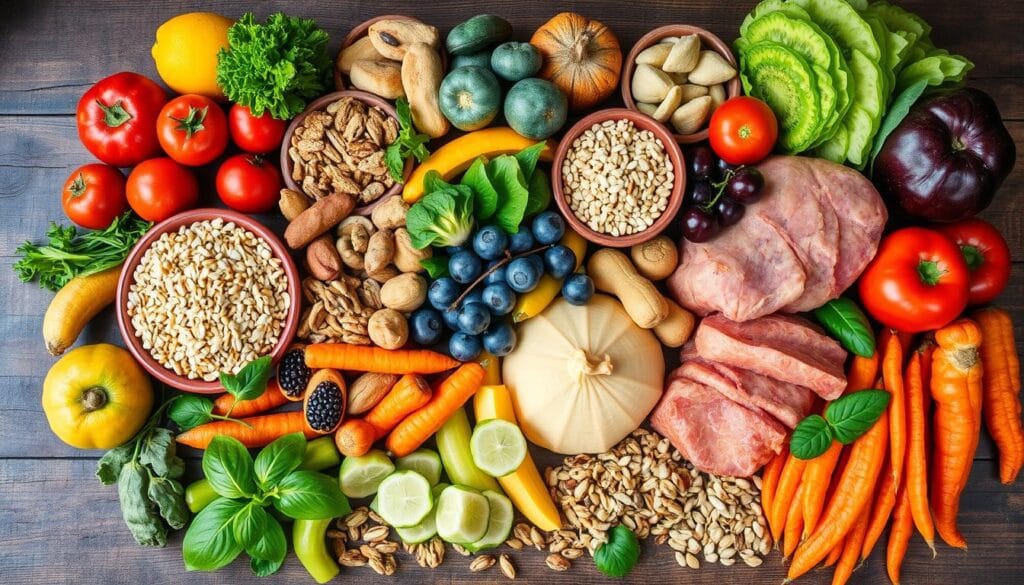Why Am I Eating Less but Gaining Weight? Find Out Now
Have you ever looked at the scale and felt confused? I know this feeling well. It happens when I eat less but still gain weight and no weight loss. This makes me wonder about my body and food choices.
Even though I eat fewer calories, gaining weight feels like a joke. It’s frustrating. So, I decided to learn more about why this happens. We’ll look into how to manage weight and why our bodies sometimes don’t do what we want.

Key Takeaways
- Understanding the complexities of weight management is essential.
- Eating less may not always lead to the expected weight loss.
- Metabolism and hormonal imbalances can impact weight significantly.
- Gut health plays a crucial role in digestion and weight control.
- Quality of calories consumed matters just as much as quantity.
- Mindful eating and whole foods can positively affect weight management.
Understanding Weight Gain Dynamics
Gaining weight can be confusing, even when I eat right. Many factors affect weight gain, like energy balance and food quality. It’s not just about calories; how my body uses them matters a lot.
Calories are key to understanding weight gain. If I eat more than I burn, I gain weight. This balance is influenced by:
- Genetics: My genes can make me more likely to gain weight.
- Lifestyle Choices: Being less active means burning fewer calories.
- Nutritional Quality: Foods with lots of sugar and bad fats affect how I store energy.
These points show that managing weight is more than just eating less. It’s about making healthy choices that help my body. Knowing these dynamics helps me tackle my food challenges.
My Journey with Food and Weight
I started to learn how food affects my body early on. I tried many diets to lose weight. Each diet taught me something new.
I faced many diet rules that changed how I felt about food. Some diets promised fast results but led to yo-yo dieting. I learned to focus on healthy eating, not just losing weight.
Finding a balanced diet was key. Eating healthy foods and watching my portions helped me. This way, I listened to my body and felt good about what I ate.
My journey had ups and downs, but I learned to accept myself. Every mistake taught me something new. I found that being flexible with my diet worked better for me.
Looking back, I see how my story can help others. Sharing my journey shows that we’re not alone. It’s about finding healthy habits that work for us.
| Eating Habits | Impact on Weight Loss |
|---|---|
| Balanced meals with whole foods | Promoted steady weight loss |
| Strict dieting | Led to weight regain |
| Mindful eating practices | Improved relationship with food |
| Emotional eating | Contributed to weight fluctuations |
The Role of Metabolism in Weight Management
Metabolism is key for anyone trying to manage their weight. It’s how my body turns food into energy. This happens through metabolic pathways that show how well I burn calories.
Many things affect my metabolic rate. Age is one; as I get older, my metabolism slows. Genetics also play a part, shaping how my body handles food and fat. Having more muscle helps my metabolism too. This means I might gain weight even if I eat less.
Here’s a summary of key factors influencing metabolism:
- Age: Slower metabolism as I age.
- Genetics: Inherited traits that affect how my body processes food.
- Muscle Mass: More muscle equals a higher metabolic rate.
Knowing these factors helps me make better food choices. Understanding my metabolism is crucial for managing my weight.
Factors Contributing to Eating Less but Gaining Weight
It’s confusing when we eat less but still gain weight. Many things can cause this problem. For example, the quality of our food matters a lot. Even if we eat less, bad food choices can still make us gain weight.
Drinks can also affect our weight. Drinks like sugary sodas or fancy coffee can have lots of hidden calories. These calories can add up and make us gain weight, even if we eat less.
Snacking is another issue. Sometimes, we snack without thinking about it. Choosing unhealthy snacks like chips or cookies can stop us from losing weight.
Our feelings also play a big part in how much we eat. Feeling stressed or happy can make us eat more than we planned. It’s important to know when we’re eating because of our feelings.

Stress and Its Impact on My Eating Habits
Stress really changes how I eat. When I’m stressed, I often eat more. This can lead to eating foods that are not good for me. Stress also makes my body change. It releases hormones like cortisol. This can make me want to eat even when I’m not hungry.
It’s hard to stop eating because of stress. But knowing how stress affects me is a big step. I’m trying to eat better and manage my stress. I want to eat in a way that’s good for my body and mind.
| Stress Level | Type of Food Craved | Log of Eating Habits |
|---|---|---|
| Low | Healthy snacks (fruits, nuts) | More controlled portions |
| Moderate | Comfort foods (chips, ice cream) | Occasional binge eating |
| High | Fast food (pizza, burgers) | Frequent overeating |
Eating Less but Gaining Weight: Possible Hormonal Imbalances
I often wonder why eating less can still lead to weight gain. Hormones are a big part of this puzzle. They control how our body works, like how we eat and store fat. For example, insulin helps our body use glucose and store fat.
When insulin levels are high, our body might store more fat. This can cause us to gain weight even if we eat less.
Leptin is another hormone that’s important. It tells our brain how much energy we have. If leptin isn’t working right, we might feel hungrier and have trouble losing weight.
Ghrelin, or the hunger hormone, also plays a role. More ghrelin means we might want to eat more.
Some health issues, like PCOS and thyroid problems, can mess with these hormones. PCOS can make women gain weight, even if they eat less. Thyroid issues can slow down our metabolism, making it harder to lose weight.
Learning about hormonal imbalances and weight gain has changed how I think about diet and health. It shows how important it is to check hormone levels if we’re gaining weight. This makes me want to try new ways to fix it, like changing my lifestyle and getting medical help.

| Hormone | Role | Impact on Weight |
|---|---|---|
| Insulin | Regulates glucose and fat storage | Increased levels can lead to weight gain |
| Leptin | Signals energy balance to the brain | Disruption may cause increased hunger |
| Ghrelin | Stimulates appetite | Higher levels can increase food intake |
| Thyroid Hormones | Regulate metabolism | Low levels can lead to weight gain |
| Estrogen | Affects fat distribution | Imbalances can lead to weight fluctuations |
The Importance of Gut Health
Keeping my gut healthy is key to feeling good. My body needs a balance of good bacteria to digest food well. Knowing this helps me make choices that help my health and weight.
Probiotics and Their Role in Digestion
Probiotics are good bugs that help my stomach. They break down food and help me get nutrients. This is important for my energy and health.
Some foods with probiotics are:
- Yogurt
- Kefir
- Fermented vegetables, like sauerkraut and kimchi
- Miso and tempeh
Eating these foods makes my gut healthier. This helps me stay at a good weight.
How Gut Bacteria Influence Weight
My gut has trillions of bacteria. The right mix is important for my weight. If it’s off, I might gain weight or have trouble losing it.
- Too much inflammation can slow down my metabolism.
- It can also change how I store fat and digest food.
- It might mess with hormones that control hunger.
Knowing this helps me take care of my gut. Eating probiotics and keeping my gut balanced helps my digestion and weight.
| Food Sources | Probiotic Type | Health Benefits |
|---|---|---|
| Yogurt | Lactobacillus | Improves digestion and boosts immune function |
| Kefir | Kefir grains | Enhances gut health and may reduce lactose intolerance |
| Sauerkraut | Leuconostoc | Rich in vitamins and aids digestion |
| Miso | Aspergillus oryzae | Supports healthy digestion and essential nutrient absorption |
While incorporating probiotic-rich foods like yogurt, kefir, or kimchi into your meals is an excellent way to support gut health, it’s not always easy to do consistently. That’s where LeanBiome comes in—a convenient option to ensure your body gets the probiotics it needs daily.
This product is designed to provide a blend of gut-friendly bacteria that work to balance your digestive system. Its simple, straightforward formula can fit seamlessly into your routine, whether you’re busy at work, traveling, or just trying to maintain a healthy lifestyle.
Why Consider It?
Probiotic supplements like LeanBiome offer some great benefits:
- Convenience: You can take it on the go, making it easier to stay consistent with your gut health.
- Variety: With a mix of strains, it supports different aspects of digestion and nutrient absorption.
- Immune Boosting: Regular probiotics may help strengthen your body’s defenses.
This makes it a helpful choice for those who might not always have access to probiotic-rich foods or who want a little extra support for their digestive health.
Things to Keep in Mind
As with any supplement, it’s good to weigh the pros and cons:
- Pros: Easy to use, supports digestion, and helps with maintaining a healthy gut balance.
- Cons: Results may take time to notice, and supplements don’t replace the importance of a healthy diet.
How to Use It
Using LeanBiome is simple—just follow the recommended dose, and you’re good to go. Whether you take it with breakfast or as part of your nighttime routine, it’s a small step that can make a big difference for your gut health.
Click To Check Out LeanBiome Directly From Its Official Website
Understanding Calories: Quality vs. Quantity
I learned that not all calories are the same. Counting calories helps with weight loss. But, the quality of food matters a lot for health and feeling full.
Whole foods like fruits, veggies, and lean proteins are better than processed foods. They have vitamins, minerals, and fiber. This makes you feel full. Processed foods have empty calories that can make you eat too much without giving you nutrients.
Here’s a table showing the difference between different calories:
| Type of Food | Calories per Serving | Nutritional Benefits | Satiety Level |
|---|---|---|---|
| Apples (Whole) | 95 | High in fiber, vitamins | High |
| Potato Chips (Processed) | 150 | Low in nutrients | Low |
| Grilled Chicken (Whole) | 165 | High in protein | High |
| Fast Food Burger (Processed) | 300 | High in unhealthy fats | Medium |
Eating quality food changed my life. It boosted my energy and made me feel good. Choosing foods rich in nutrients helped me stay on track without feeling hungry.

Exercising and Not Losing Weight: What Could Be Wrong?
Regular exercise should help us lose weight. But, I’m exercising and not losing weight. This is very frustrating. It’s often because of common mistakes in our exercise routines.
These mistakes can stop us from losing weight. Proper recovery is key for losing weight and feeling good.
Common Mistakes in My Exercise Routine
Many people, including me, make the same mistakes. Some common ones are:
- Overtraining: Working too hard without rest can make us tired. It might even slow down how fast we burn calories.
- Neglecting Strength Training: We might only do cardio. But, strength training is important for building muscle and boosting our metabolism.
- Inconsistent Schedule: Skipping workouts or not sticking to a routine can stop us from making progress.
Rest and Recovery: The Hidden Factors
Recovery is a big part of exercising. Without enough rest, our body stays stressed. This can make us gain weight, even if we exercise a lot. It’s important to know how to recover well:
- Sleep: Not getting enough sleep can slow down muscle repair. It can also make us want to eat more, which can stop us from losing weight.
- Nutrition: Eating the right foods after working out helps our body recover. It also gets us ready for the next workout.
- Active Recovery: Doing low-intensity activities like walking or yoga helps our muscles recover. It doesn’t put too much strain on us.
Effective Fat Loss Tips That Make a Difference
Using good fat loss tips can change how you manage your weight. I’ve found some great ways to help. Mindful eating and eating whole foods are key for me.
Mindful Eating Practices
Mindful eating helps you be more aware when you eat. It makes you enjoy your food more. Here are some tips for mindful eating:
- Listen to your body’s hunger signals before eating.
- Eat slowly and chew well to enjoy your food.
- Don’t eat in front of screens to stay focused.
- Think about where your food comes from to appreciate it more.
Incorporating Whole Foods Into My Diet
Eating whole foods is also very important. They are full of nutrients and good for losing fat. Here’s a comparison of whole foods and processed foods:
| Type of Food | Nutritional Value | Impact on Fat Loss |
|---|---|---|
| Whole Foods | High in fiber, vitamins, and minerals | Promotes fullness and controls hunger |
| Processed Foods | Often high in sugar and unhealthy fats | Can cause overeating and weight gain |
Mindful eating and whole foods have helped me a lot. They make my diet better and help me stay healthy.
Conclusion
Looking back, I see that eating less but gaining weight is complex. It involves many factors. I’ve learned that cutting calories isn’t enough.
It’s important to understand how our body works. This includes our metabolism, hormones, and gut health. These things affect how we gain or lose weight.
I’ve found that losing weight is not simple. It needs a whole approach. This includes eating mindfully, exercising regularly, and managing stress.
By focusing on these areas, I can make better choices. This helps me reach my weight goals. It shows that a balanced plan can beat the odds.
Now, I’m ready to use what I’ve learned. I want to lose weight for good. I’ll focus on my health and understand how it works.
By seeing nutrition and wellness as a big picture, I can face weight challenges better. This way, I can succeed in my weight loss journey.
FAQ
Why am I eating less but gaining weight?
Eating less but gaining weight can happen for many reasons. Hormones, stress, and food quality might play a part. It’s important to think about what you eat and your lifestyle too.
What fat loss advice can help me if I’m not losing weight with diet and exercise?
Try eating mindfully and choose whole foods. Also, manage your stress and check your workout routine. Look out for mistakes like overtraining.
Can stress from my daily life affect my eating habits?
Yes, stress can make you eat unhealthy foods. It can make you want to eat more because of changes in your body’s hormones.
How does metabolism influence my ability to lose weight?
Your metabolism is how your body uses food for energy. It can change with age, genetics, and muscle. Knowing your metabolism helps you lose weight better.
What role do hormonal imbalances play in eating less but gaining weight?
Hormones like insulin and ghrelin control hunger and fat. If they’re not balanced, you might gain weight even if you eat less.
Can my gut health affect my weight management?
Yes, gut health is key for digestion and weight. Poor gut health can cause inflammation and weight gain. Eating probiotics can help your gut.
Can I take the LeanBiome supplement if I am on other medications?
If you are taking other prescription medications or have any health condition, it is suggested to consult with a doctor before taking a health supplement.
Is the LeanBiome formula vegetarian-friendly?
The manufacturer assures that the LeanBiome formula is vegan and it is vegetarian-friendly.
Why might I not be losing weight even with regular exercise?
It could be because of mistakes in your workout, not enough rest, or bad food after working out. Look at your whole lifestyle to understand.
What are some effective fat loss tips I can try?
Eating mindfully and choosing whole foods helps a lot. Listen to your hunger and eat foods that are good for you.


